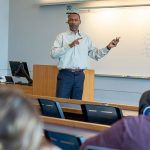“While all levels of government are working overtime to solve the immediate issues of controlling the coronavirus and flattening the curve, it is apparent we were not prepared for dealing with a pandemic of this magnitude,” says former Neag School dean Richard Schwab and University of Rhode Island’s Richard Rhodes III.
“My kids are watching TV, playing video games and eating cookies,” says Jennie Weiner, a professor of educational leadership at the Neag School of Education and mother of two boys. “It’s fine.”
This practice brief shares tips for maintaining continuity of learning through defining classroom expectations for remote (i.e., distance) instruction and online learning environments. With a few adaptations, teachers can use a PBIS framework to make remote learning safe, predictable, and positive.
School-wide positive behavioral interventions and supports (PBIS) is an evidence-based framework for improving school climate, social-emotional competence, and academic achievement, and decreasing unsafe behavior in schools. Just as in a brick-and-mortar school, PBIS can be used to make virtual (i.e., online) education more effective.
Sandy Chafouleas shared the Direct Behavior Rating (DBR) can be effective and efficient as a progress monitoring tool as well as a targeted screening tool.
“It has the potential to be awesome, but not this way,” said Michael Young, a University of Connecticut professor who specializes in education technology.
If you are a baseball fan, the name Doug Glanville is probably familiar. Glanville, who studied engineering at the University of Pennsylvania, had a nine-year career in the major leagues, including a five-year stint with the Philadelphia Phillies. But UConn students may know him in an additional capacity: Glanville became an adjunct professor in the Neag School of Education in the fall of 2019.
As COVID-19 continues to alter social and economic landscapes around the world, some are more immediately impacted than others.
Former Major League Baseball player Doug Glanville now teaches a class in the Neag School of Education.
“Thanks to the coronavirus, my third-grade twins are home all day for the foreseeable future,” says Jennie Weiner. “I’m not going to recreate school for them.”
Clewiston Challenger never intended to be a researcher. When he was young, Challenger wanted to be a police officer. As an undergraduate at the University of Connecticut, he originally majored in biology with the aim of becoming a scientist.



